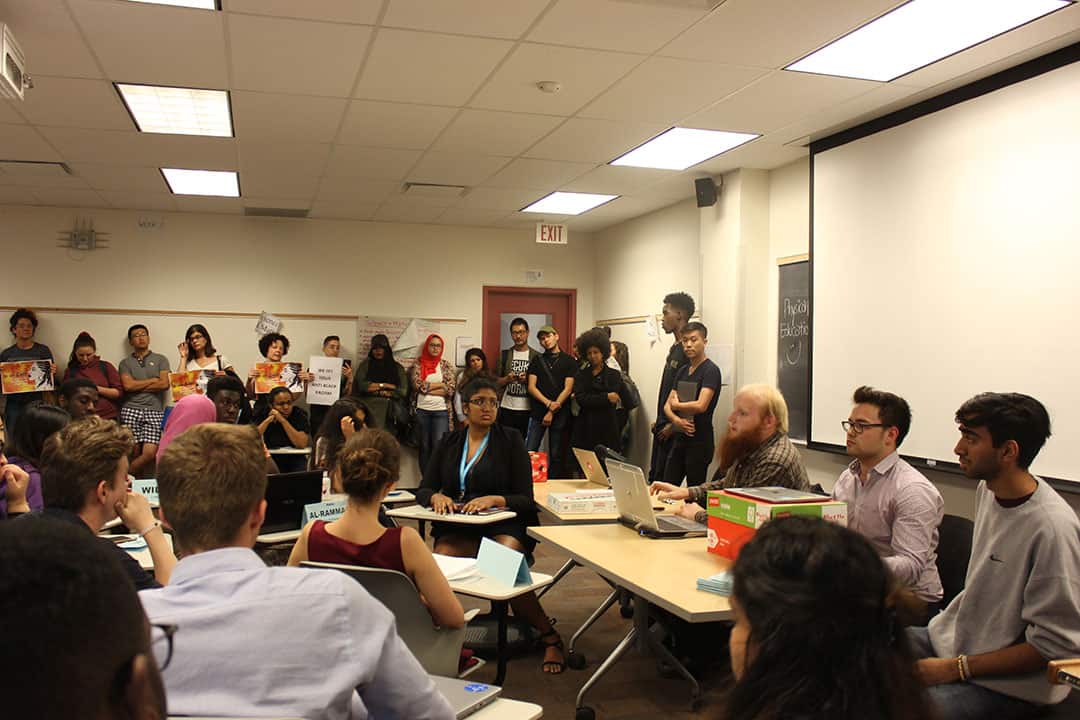On July 20, the University of Toronto Students’ Union’s (UTSU) monthly Board of Directors meeting adjourned prior to completing its agenda due to interruptions and protests from members of the U of T chapter of the Black Liberation Collective (BLC).
The members of the BLC were protesting the board’s decision to discuss an agenda item regarding a second legal opinion on the UTSU’s lawsuit against former-Executive Director Sandra Hudson in camera. In camera is when only UTSU board members are allowed to be in the room while discussion is underway.
The BLC gave a presentation at the beginning of the board meeting after speaking rights were granted to all those present in the room. Former UTM Director Hashim Yussuf condemned the UTSU’s lawsuit against Hudson, stating “this lawsuit is nothing but anti-Blackness.” Another member of the BLC, Yusra Khogali, accused the UTSU of “character assassination” of Hudson.
Members of the BLC also accused the UTSU of acting in bad faith following a motion on the agenda to rescind an April 29 board meeting motion requiring the board to seek out a second legal opinion on the Hudson lawsuit. That motion stipulated that “the Black Liberation Collective be engaged in the selection process,” of a second lawyer, and that the lawyer must “identify as Black, practice employment law, and have a background in equity work.”
Protesters asked the board to ensure that no part of the meeting go in camera, citing accountability and openness. However, when the time came to discuss the second legal opinion, the meeting was moved in camera nonetheless. This occurred at approximately 7:08 pm, and the meeting stayed in camera until approximately 8:49 pm, when BLC members forced their way into the meeting room, chanting “if Sandy don’t get it, shut it down.”
The Varsity live-streamed most of the meeting and protests through its Facebook page. The second live-stream posted by The Varsity (below) was cut short when a member of the BLC hit the live-stream camera out of the reporter’s hands.
Members of the board and protesters from the BLC engaged in a discussion regarding in camera proceedings, the ethics of the lawsuit, and the organizational structure within the UTSU that makes it a requirement to get all board members up to speed on issues surrounding the lawsuit at each meeting.
Ultimately, it was decided that BLC members would exit the room, allowing the board 15 more minutes to discuss the second legal opinion in camera. The motion to rescind the requirement for this second legal opinion, however, would be discussed with BLC members present in the room.
“If we’re discussing something confidential, we need to go in camera,” UTSU President Mathias Memmel wrote in an email to The Varsity. “In this case, we were discussing documents protected by litigation privilege.”
Litigation privilege applies to legal discussions occurring between counsel and a client, with the purpose being to create a ‘zone of privacy’ so as to prepare a case to the client’s best advantage. According to Memmel, the UTSU uses this privilege to move discussions in camera because case-sensitive information may be presented, as well as certain lawyer’s rates, past clients, and personal information.
While discussions took place on whether or not to pass the motion to rescind, Mathematical and Physical Sciences Director Wilson Wu noted that if the UTSU board chooses to drop the lawsuit against Hudson, it will lose the money it has apparently spent on the lawsuit. Wu also noted that the only possible way that a second legal opinion could affect change would be if it led them to drop the lawsuit.
Other board members, such as Law Director Aidan Fishman, questioned whether seeking a second legal opinion would mitigate any “losses or problems” stemming from the lawsuit, while Memmel stated that he had trouble understanding what a second opinion adds to a “decision tree,” reiterating his confidence in the UTSU’s legal position regardless of a second opinion.
Janaya Khan, one of the protesters, warned the Board that it may lose the trust of the student body should it not seek a second legal opinion. “You all are inheriting something you that you never started,” said Khan. “But you can decide how it ends.”
Later in the meeting, a straw poll was conducted to predict the outcome of the vote on the motion to rescind. A straw poll is an unofficial, non-binding vote used to test the opinion of a voting body. The straw poll revealed that the motion to rescind the requirement of a second legal opinion would pass by a vote of 15 in favour and 12 opposed.
After more discussions, protesters begun chanting again and Chair Billy Graydon adjourned the meeting abruptly. As UTSU board members exited the room, protesters chanted “hey hey, ho ho, your anti-Blackness has got to go.”
“These people became disruptive as soon as they realized that they were going to lose and the motion to rescind was going to pass,” Memmel wrote to The Varsity. “They’re not interested in doing what’s right–they’re interested in winning. I don’t respect that, and I’m not bothered by the fact that unprincipled people don’t like me. In fact, I welcome it.”
The BLC did not respond to The Varsity‘s request for comment.
The next UTSU Board of Directors meeting will be held in August, where the question of a second legal opinion will go to a vote.
The Hudson trial is set to begin in October.
Editor’s Note: a previous version of this article incorrectly claimed that the UTSU has spent $277,000 on the lawsuit against Sandy Hudson. The $277,000 actually refers to the amount that the UTSU is seeking from Hudson.
Editor’s Note: this article has been updated to reflect that Mathematical and Physical Sciences Director Wilson Wu argued that the only possible way that a second legal opinion could affect change would be if it led them to drop the lawsuit.


